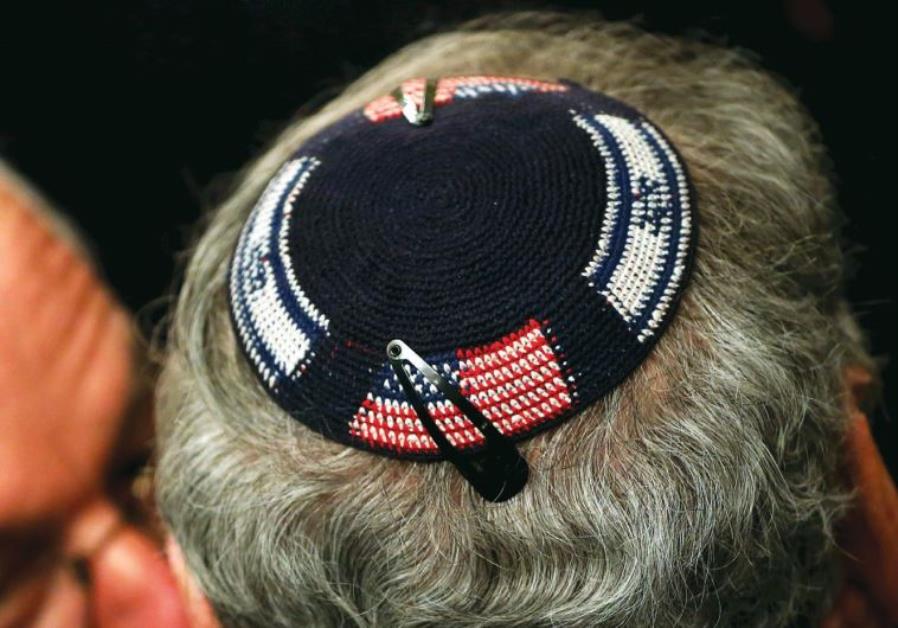Leaked letter: Chief Rabbinate blacklisted dozens of U.S. Orthodox rabbis

A man wears a kippa embroidered with US and Israeli flags. (photo credit: REUTERS)
An internal letter between a senior rabbinical court official and the rabbinical court made public on Monday has demonstrated once again that the Chief Rabbinate has blacklisted certain Orthodox rabbis and organizations in North America and does not recognize their credentials.
The letter, obtained by the ITIM religious services advisory and lobbying group, was written by Rabbi Asher Ehentrau of the Rabbinical Courts Administration to the rabbinical court in March regarding a question the court had about a woman seeking to get married.
Immigrants marrying through the rabbinate need to provide a declaration from a communal rabbi from their country of origin, showing that the rabbi knows them to be Jewish. However, the Chief Rabbinate has repeatedly rejected letters affirming Jewish status by some Orthodox Diaspora rabbis.
In particular, numerous rabbis ordained in Yeshivat Chovevei Torah in New York or are members of the International Rabbinic Fellowship, institutions associated with the liberal Orthodox movement sometimes known as “Open Orthodoxy,” have had their affirmations of Jewish status rejected by the Chief Rabbinate.
In Ehentrau’s letter to the rabbinical court, he writes that the rabbi in question, Rabbi Akiva Hertzfeld, “is a member of the Chovevei Torah association of rabbis who call themselves modern Orthodox and are not recognized by the Chief Rabbinate of Israel.”
Hertzfeld served as rabbi of the Sha’arei Tefila congregation in Portland, Maine, and immigrated to Israel in 2013.
There are some 124 rabbis who have been ordained by Yeshivat Chovevei Torah, all of whom are ostensibly not recognized by the Chief Rabbinate and the rabbinical courts, including its founder Rabbi Avi Weiss.
Ehentrau said he could therefore not authorize the Jewish status of the applicant on the basis of Hertzfeld’s letter, and said that she should therefore be in touch with him for a “thorough clarification.”
The Chief Rabbinate has never formulated clear and transparent criteria for recognizing the credentials of Orthodox Diaspora rabbis, despite having committed to doing so to the Jerusalem District Court back in 2015.
A special committee in the Chief Rabbinate was established in 2016 to draft such criteria, but in January it was discovered that the committee had only convened once in two years.
In the meantime, the Chief Rabbinate was forced to disclose to ITIM last year a partial list of some 160 rabbis from around the world, including many Orthodox rabbis, whose authority to approve Jewish and marital status it has rejected.
Among those on that list were Weiss and other rabbis associated with Yeshivat Chovevei Torah and the International Rabbinic Fellowship.
ON MONDAY, the Knesset Immigration and Absorption committee was told by Chief Rabbinate director-general Rabbi Moshe Dagan that work on the criteria was ongoing, and the criteria for recognizing Orthodox rabbinical courts in the Diaspora have been drafted and would soon be brought before the Council of the Chief Rabbinate for approval.
ITIM NOW says that Ehrentrau’s letter proves what they have claimed all along: That the Chief Rabbinate has specific policies against rabbis and institutions it deems to be not sufficiently stringent, without having ever formulated concrete criteria by which such decisions can be evaluated in a transparent manner.
“The Chief Rabbinate has repeatedly claimed that there are no blacklists. However, the testimony of an orthodox rabbi was rejected only because he belonged to an institution that the rabbinate does not like,” said ITIM director Rabbi Seth Farber following ITIM’s release of Ehrentrau’s letter.
“Importantly, this act contravenes Jewish law and tradition. Throughout the generations, there have been Jewish communities throughout the world with different halachic [Jewish law] approaches. Nevertheless, the communities treated each other with respect and recognized each other’s halachic authority.”
The Rabbinical Courts Administration said in response, “There is no closed, consolidated list of which Diaspora rabbis are recognized by the Chief Rabbinate of Israel…. When there is no up-to-date information, the rabbinical court examines each case on its merits, and is assisted by experts when necessary. Rabbi Asher Ehrentrau, who knows and is an expert in rabbinates and rabbinical courts in the Diaspora, is one of the experts the rabbinical courts uses to assist them and the information he has been accepted by the Chief Rabbinate for many years.”
The Chief Rabbinate responded by saying it cannot relate to documents written by officials of the Rabbinical Courts, and insisted that it does not issue blanket rejections of rabbis. In fact, a spokesman for the Chief Rabbinate told The Jerusalem Post that letters of affirmation for Weiss have been accepted in the last three years.
“The Chief Rabbinate does not reject rabbis or groups of rabbis who belong to one community or another.
The Chief Rabbinate of Israel receives documents and affirmations which are examined on their merits.
Over the years, documents from rabbis associated with the Chovevei Torah community have been received and approved. In the next meeting of the Council of the Chief Rabbinate, criteria will be approved determining recognition of rabbinical courts in the Diaspora,” it said in its statement.
Speaking to the Post, Herzfeld expressed anger at the way his former congregant had been treated by the Chief Rabbinate, saying she had been told just weeks before her wedding that her Jewish status had not been approved.
“How is it that the entryways to Israel are controlled by people who do not seem to show any care for the Jewish people?” asked Herzfeld.
He said that the officials from the rabbinical courts and the Chief Rabbinate had not sought to contact him to understand the case and had not returned his calls when he tried to resolve the situation for the woman.
“It is so irresponsible. They don’t want to speak to the rabbi who has the documents and knows the story.
The Chief Rabbinate decides without any facts, on their own whim that this woman isn’t Jewish,” he said.





Comments are closed.